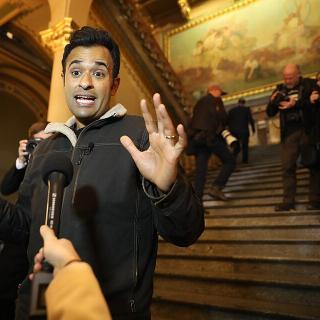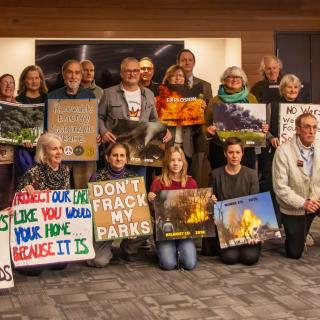Advertisement
“This is a tale of two cities,” said Tammy Alsaada of the Ohio Organizing Collaborative last Thursday at the Fort Hayes Education Center. She was speaking at a public meeting and candidates’ night about two populations in Columbus: those who are prosperous and feel protected by the police, and others who suffer from economic inequality and don’t feel protected. The theme of the public meeting was “Our City, Our Stories, Our Future.”
Ten candidates for Columbus City Council attended the event, organized by the Ohio Student Association and the People’s Justice Project. Conspicuously absent were invited mayoral candidates Andrew Ginther and Zach Scott.
Civilian Review Board
Addressing a recent proposal by City Council president Andrew Ginther to equip Columbus police officers with body cameras, OSU graduate student Nicole Barnaby noted that the police killings of John Crawford and others in Ohio were caught on camera but the officers involved were not held accountable. “The issue of police accountability cannot be solved by simply capturing incidents on camera,” she said.
Civilian review boards have been have been successfully implemented in cities across the country “to protect citizens’ rights, ensure effective policing, and to build trust between the police and the communities they’re supposed to serve,” Barnaby said.
“We can’t sue our way out of this problem,” said Torin Jacobs, founder of Columbus Citizens for Police Review. “We can’t body cam our way out of this problem.”
Moderator Stuart McIntyre posed this question to the candidates: “If elected to City Council, will you implement a civilian review board to oversee the Columbus Police Department?”
Write-in candidate Joe Motil (D) said yes. “When you give someone authority to carry a gun, there needs to be a truly independent body which has the authority to review allegations of excessive force,” he said.
Incumbent Democrats toed the party line in their answers. “I do not agree with a civilian review board that has subpoena power over police officers,” said Zach Klein. “I do think it’s important that they have body cameras.”
Not buying it, audience members shouted, “Black Lives Matter!”
“I believe that we need to bring in community leaders like yourselves to have periodic conversations with the police department and the police chief,” Klein said. The audience wasn’t buying that, either.
“I do believe we need a civilian review board,” said non-incumbent candidate Elizabeth Brown, who was selected by Council to replace Michelle Mills as a candidate. As Sherrod Brown’s daughter, she will probably be a shoo-in. Brown followed with a lot of qualifications, probably in anticipation of working alongside Klein after the election.
“I don’t believe it’s a panacea,” Brown said. “I think that Zach is right, that there’s a host of other things that we have to fight for in addition.” A civilian review board “is not a one-trick pony. We’ve got to be comprehensive about how we look at this problem.”
A non-incumbent to Council but still a Democratic Party insider, Michael Stinziano responded in much the same vein as Brown. So did incumbent Shannon Hardin. A good way to defuse support for a specific initiative is to shift the focus to the big picture.
Incumbent Democrat Jaiza Page toed the party line by playing the definition game: “My review board would come in the form of citizens being able to help with the policies and how those policies are implemented.” When pressed by the audience for a yes or no answer, she said, “I just have a different definition of a citizens’ review board.”
While most of the Democrats worked hard at being moderates, Republican candidates bent over backward to present themselves as more progressive than the Democrats on this issue. As political outsiders, they were free to take an alternative position, however inconsistent with the GOP’s real priorities.
“What we need to do, on top of a civilian review board, is have police officers who live in the city,” said Ibrahima Sow. “It will make them more accountable, because now they’re our neighbors.”
“I definitely think there should be a civilian review board, but citizens have to actually get out and educate themselves on what the cops are doing,” said Dimitrious Stanley.
“I am an engineer. I look at numbers,” said Besmira Sharrah. “Numbers don’t lie. Police violence in Columbus is sufficient for us to want to make a change. We need to have independent people [on the civilian review board]. We can’t have people who have a certain interest to make investigations go in one direction.”
“The short answer is yes,” said John Rush. “How many individuals would not be in jail or prison if there were greater accountability?”
Are the Republican candidates being sincere? At least they’ve gone on the record as supporting independent public oversight of the police force. If any of them are elected, we can hold them accountable.


